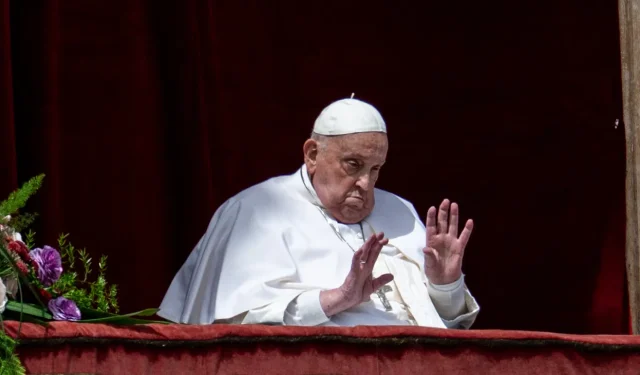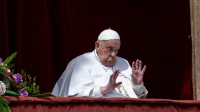Pope Francis Passes Away at 88: A Reflection on His Legacy
Pope Francis, history’s first Latin American leader of the Catholic Church, passed away on Monday at the age of 88. Known for his humble demeanor and compassion for the poor, he became a significant figure across the globe, though his progressive views often clashed with conservative factions within the Church. The Vatican announced that his death resulted from a stroke that left him in a coma, culminating in heart failure.
Following the news of his passing, bells rang out from Catholic churches worldwide, from Argentina to the Philippines, and resonated throughout Rome. Cardinal Kevin Farrell shared the somber announcement from the chapel of the Domus Santa Marta, where the Pope resided, stating, “At 7:35 this morning, the Bishop of Rome, Francis, returned to the home of the Father.”
Pope Francis had battled health issues, including chronic lung disease, stemming from a lung surgery in his youth. His most recent hospitalization began on February 14, 2025, for a respiratory crisis that escalated to double pneumonia, leading to a 38-day stay at Gemelli hospital—the longest of his papacy. Notably, he made his final public appearance just a day before his death on Easter Sunday, passionately blessing thousands in St. Peter’s Square, where he had first been introduced to the world as the 266th Pope in 2013.
A Transformative Papacy
Jorge Mario Bergoglio, as he was originally known, ushered in a new tone for the papacy characterized by humility and outreach to society’s marginalized. His recognition of the Church’s need for reform followed the tumultuous tenure of Pope Benedict XVI, whose resignation opened the door for Francis to lead the Church into a more inclusive era. However, this progressive approach alienated some conservative members, particularly with his stances on LGBTQ+ inclusivity and economic justice.
In an effort to redefine the role of the Church in contemporary society, Pope Francis called for a reassessment of economic structures, especially in light of the COVID-19 pandemic. “We have realized that we are on the same boat, all of us fragile and disoriented,” he said during an empty St. Peter’s Square in March 2020, emphasizing a need for collective compassion.
Reactions to His Death
World leaders reflected on his impactful legacy, with French President Emmanuel Macron expressing that Pope Francis aimed to bring joy and hope to the poorest communities. In Rome, flags were lowered to half-staff as crowds gathered in St. Peter’s Square to honor his memory. The evening following his death marked the Vatican’s first commemoration, further signaling a period of mourning.
Controversies and Challenges
While his tenure was marked by efforts towards reform and inclusivity, it was not without its challenges. In 2018, Francis faced severe criticism following his handling of sexual abuse scandals in Chile, highlighting a long-standing issue within the Church. Although he later made efforts to rectify his missteps by inviting victims to the Vatican, the struggle for justice within the Church remained a contentious issue.
His approach to issues like the death penalty and nuclear weapons also stirred debate, as he labeled them immoral, while maintaining traditional Church doctrines on marriage and sexuality. Francis did, however, encourage discussions around the roles of women in the Church, although the Women’s Ordination Conference expressed disappointment regarding his stance on ordaining women.
A Commitment to the Marginalized
Throughout his papacy, Francis emphasized a need to extend the Church’s arms to embrace all individuals, regardless of their backgrounds. His visits to marginalized communities, including an early trip to Lampedusa to highlight the migration crisis, underscored his commitment to social justice. He often advocated for the protection of the environment and showed steadfast support for communities affected by poverty and displacement.
Personal Background
Pope Francis was born on December 17, 1936, in Buenos Aires to Italian immigrant parents. His early experiences shaped his dedication to the Church and its mission to serve the vulnerable. He entered the priesthood in 1969 and gradually ascended through the ranks, becoming a cardinal in 2001. His elevation to the papacy in 2013 came after the historic resignation of Pope Benedict XVI, marking a significant turning point for the Catholic Church.
As the world reflects on Pope Francis’ legacy, it is clear that his papacy was characterized by both transformative advocacy and unrelenting challenges. His death not only signifies the end of an era but also a call for continued dialogue on pressing global issues within the Church and beyond.


